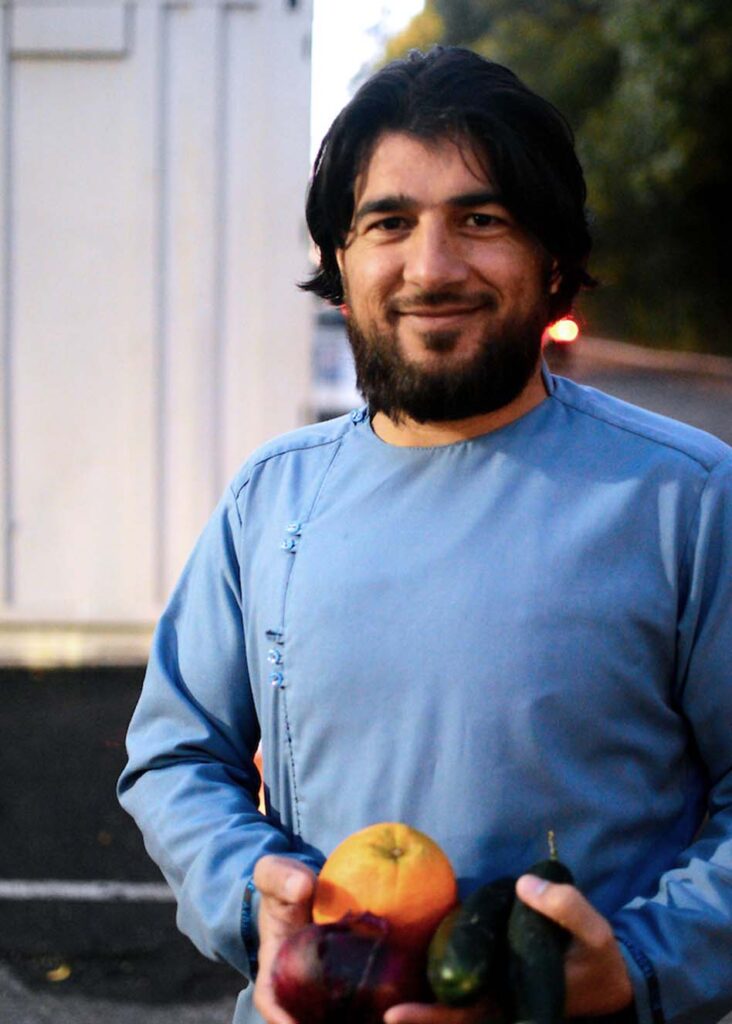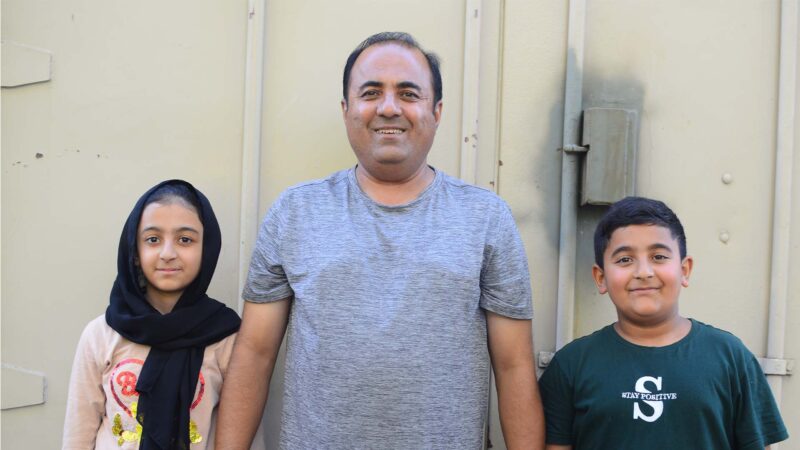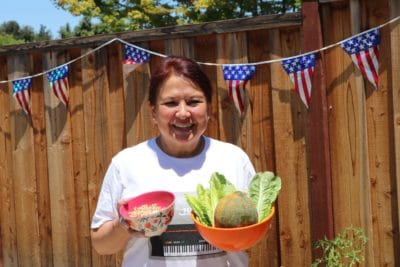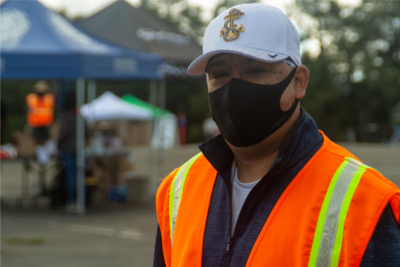Tucked behind Cryy Out Christian Fellowship in San Jose is a small but mighty free food distribution. The voices of the volunteers carry over the car engines. “How many households are you picking up for today?” “Do you want meat?” “How about bread?” Cryy Out decided to become a grocery distribution partner of Second Harvest of Silicon Valley during the pandemic. Before that, the organization provided canned and dry goods to its local community. Now Second Harvest provides Cryy Out with nutritious fresh groceries, which it distributes to the community every week.
More recently, it has begun serving a special segment of political refugees from Afghanistan – people who have been relocated here in the wake of the Taliban’s takeover. And while there are language barriers, Cryy Out has found creative ways to communicate with clients by using hand signals and even creating a visual checklist so clients can point to pictures of the food they want.
Both Cryy Out and Second Harvest are proud to serve anyone who needs nutritious food. Recently when we visited Cryy Out, we were able to meet a few people who helped American forces and they shared their stories with us.
Risking everything to help
Deciding to work with American forces took courage – the jobs were not easy and meant putting everything they cherished at risk. When the Taliban took control again, many knew they had to get out.
Aimal worked as an interpreter and says, “…we were fighting on the front lines, shoulder to shoulder with Americans. And believe me, supporting the Americans and fighting with them for a good cause, put our lives, my life, my children’s life, my wife’s life, in dangerous risk and jeopardy.”
Dilawar worked where people came into the base. He says, “That job was very difficult. Sometimes we used to go on patrol and would get ambushed by the Taliban, but luckily, we escaped.” He went on to study in India to get his bachelor’s degree in civil engineering. “When I came back to my country, the Taliban had taken over and there were no jobs.”
Najla’s husband is an electrical engineer and worked in defense logistics with US forces. Twenty-five days after they were married, the Taliban occupied Afghanistan. Soon after, she became pregnant with their son.
Aimal, Dilawar and Najla were able to escape with their families to the U.S. as political refugees on special visas.

Starting over from scratch
While coming to an area of relative safety is a blessing, it also means leaving behind everything they have ever known. Aimal says, “…we left our homes, we left our families, we left our properties, our cars, everything.” He and his family have been here five months. He recently started a new job and has moved into a house with his wife, who is pregnant, and children. He was happy to discover he’s able to walk to a food distribution by their new home.
Building a new life is daunting and the challenges can feel overwhelming. Dilawar is hopeful to put the engineering degree he worked so hard for to use to support his wife and two young daughters – in fact he keeps his graduation certificates and degree from India right on his phone so he can prove his level of education to anyone. But without a car and dependent on public transportation, he struggles to find work. He has missed out on opportunities because he doesn’t have a way to make the interviews. And despite having a degree already, “they’re asking for a California license of engineering and two years of experience here. And you have to take exams. I spent five years on my bachelor’s degree, and nobody is accepting me. It’s very difficult. I feel like I’ve wasted my time and I have become hopeless.”
The journey has been hard, but after risking their safety to help others in Afghanistan, they are now grateful to be receiving the support of others. Aimal said, “We were brought by the Federal Government because we did a lot in Afghanistan for the Americans. We put our lives at risk, and we supported them.” He went on to express gratitude for the support they have received thus far: “The Afghan people that have been evacuated from Afghanistan here to the United States, they have been receiving the food and the other items and they really appreciate it.”
Najla says, “I love that people want to help us here. I’m so happy because they don’t discriminate. They are very kind. And I appreciate this opportunity to get food. Now we have to start our life from zero and this food helps us.”
New opportunities
While they have left so much behind, new opportunities lie ahead. Najla continues to further her education – a luxury she hasn’t always been afforded. “I really want to continue my education because when I was in Afghanistan, I was born in a poor family and my father didn’t have money to pay my tuition.” She was eventually able to study computer science, but when the regime change happened, her education suddenly stopped. The Taliban closed all the universities in Afghanistan and she wasn’t able to get her diploma or transcripts from her studies in computer science. Now she has received a scholarship to study and is also taking English classes.
And she continues to explore some of the new freedoms she has living in the U.S., including driving. “There are lots of opportunities here, especially for women. Because here I can drive! I can get my permit. I try to learn driving and take my lessons. I’ve never driven before. I’ve never sat in the driver’s seat in Afghanistan! Sometimes my sister or my cousin would sit in front of the car and take photos, but I never did.”
It has been a long journey to get here, and there are still challenges to overcome. But like all parents, Najla has hopes for her son, who is just 2 years old. “I hope that my son will be a good person, first of all. And I want him to help other people. I also want my baby to complete his education.”
In the meantime, she takes comfort and enjoyment in the small things she is discovering about San Jose: “There is a park near our hotel and sometimes we drive near there and look at houses because they are so beautiful. They are more beautiful than Afghanistan houses because there are lots of flowers.”
Most of all, Najla, Aimal and Dilawar look to continue building a life for themselves and their families. Najla says, “I’m so happy to continue my life here in the U.S.A.”



